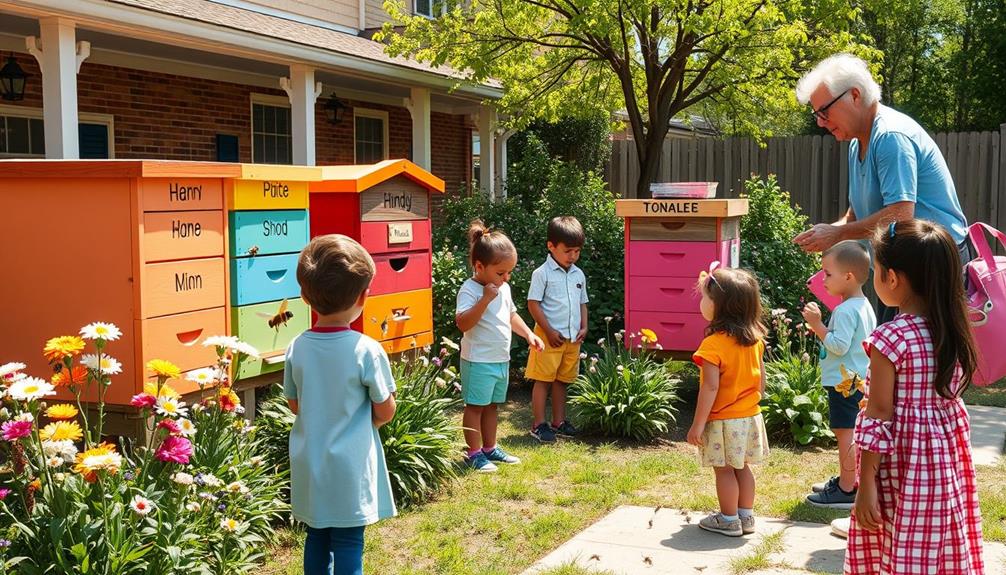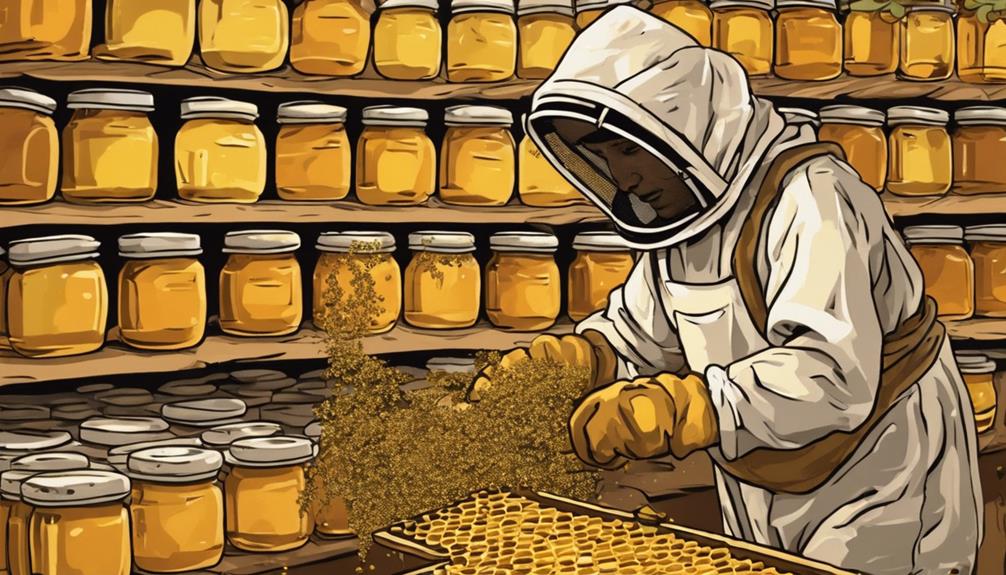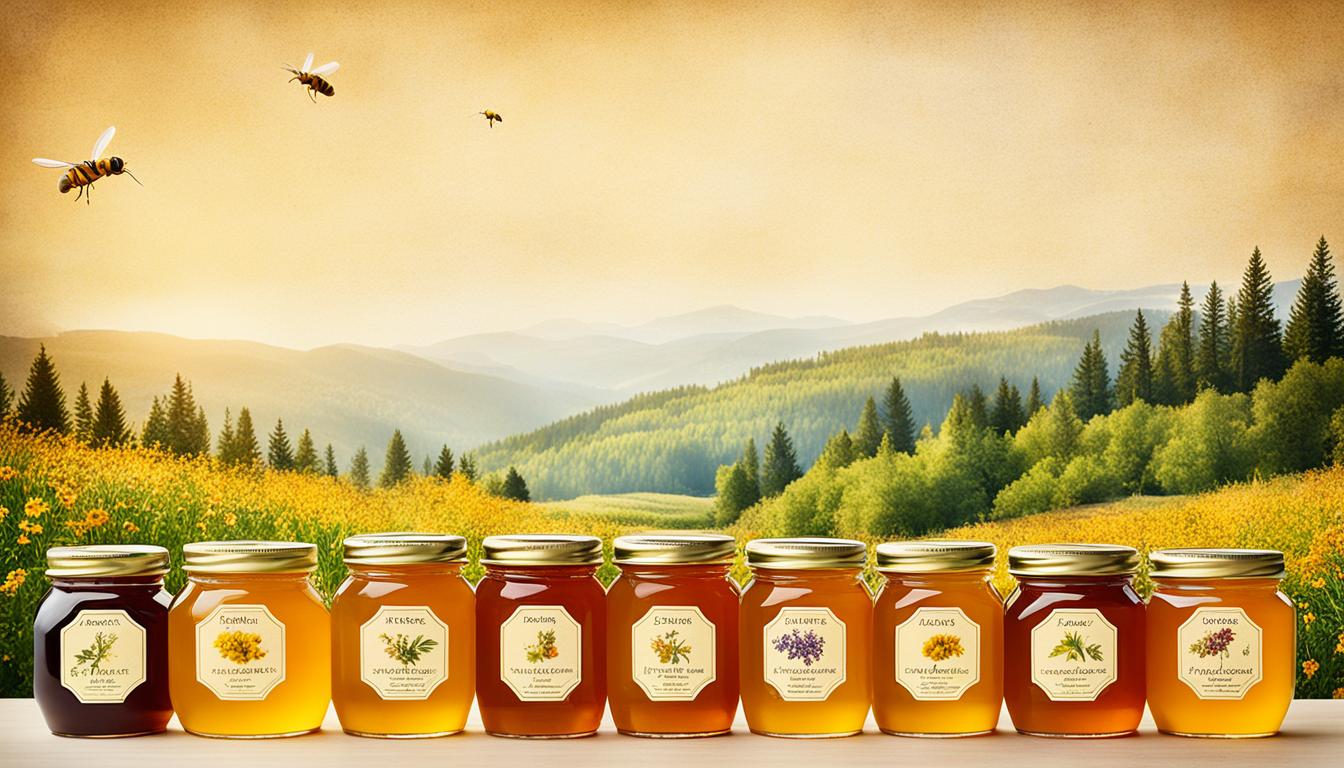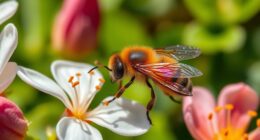Beekeeping programs in schools offer engaging, hands-on experiences that enhance your students' learning. You'll find competitions where they can creatively name bee hives, fostering excitement around these essential pollinators. These programs integrate various subjects like science, art, and math, helping students grasp the importance of bees in our ecosystem. They'll gain practical skills and teamwork experiences while participating in hive management and honey harvesting. Community partnerships and local mentorship can further enrich your program. If you're curious about how to set this up or the resources available, keep exploring the wealth of information out there.
Key Takeaways
- Educational programs for schools include hands-on learning experiences like hive inspections, honey harvesting, and interactive naming competitions for hives.
- Competitions encourage creativity and teamwork, fostering communication skills while enhancing understanding of bee ecology and mythology.
- Seasonal projects and interdisciplinary teaching materials integrate subjects like biology, art, and mathematics to enrich student learning about bees.
- Local partnerships with beekeeping associations provide mentorship, resources, and community engagement opportunities to support school beekeeping initiatives.
- Financial support from federal states in Germany facilitates the establishment and maintenance of school apiaries, promoting ecological awareness among students.
Requirements for Beekeeping Programs

To successfully implement beekeeping programs in schools, you'll need to meet several key requirements. First, it's crucial to have instructors with significant experience in working with bees. This guarantees safe and effective education for all students involved.
Additionally, incorporating lessons on financial considerations for elderly care can broaden students' understanding of responsible resource management. Next, you'll need an extensive curriculum and teaching aids tailored for bee-related lessons, which will facilitate structured and engaging learning experiences.
Additionally, schools must provide the necessary equipment, including bees, beekeeping tools, and adequate space for hive management and observation. Without this, your program won't be able to function as intended.
It's also wise to explore funding opportunities, as many schools rely on grants to acquire the beekeeping equipment vital for the program's success.
Offerings of Bee Schools
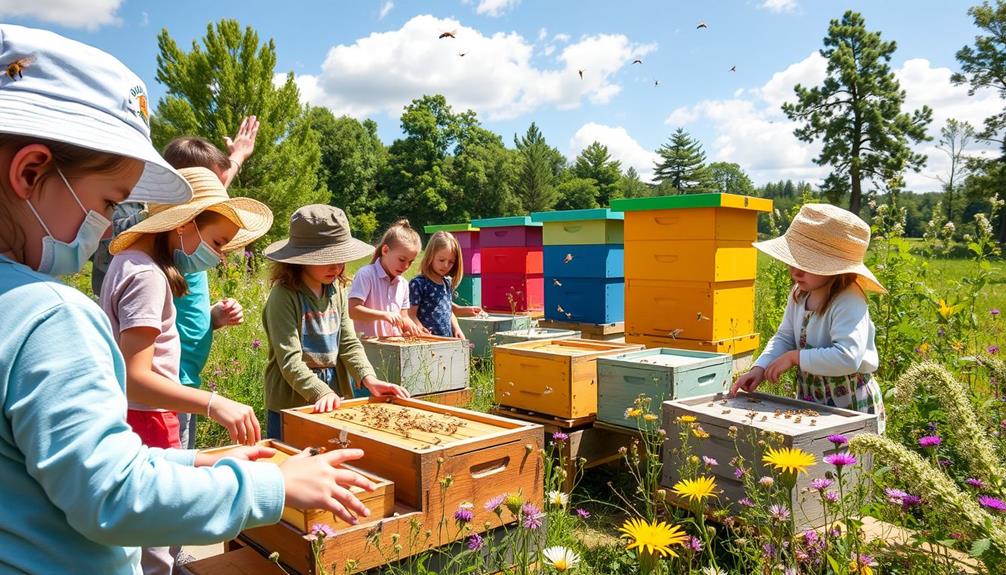
Bee schools offer a wealth of structured guidance for educators looking to integrate beekeeping into their curricula. They provide clear frameworks for organizing bee-related projects that engage students throughout the year. With seasonal activities outlined, you'll find opportunities for hands-on learning and exploration.
Here's a glimpse into what bee schools offer:
| Activity Type | Description |
|---|---|
| Seasonal Projects | Engage students with tasks like hive inspections and honey harvests. |
| Experiments | Conduct studies on bee behavior and pollination effects on plants. |
| Art Integration | Create bee-themed art projects to explore biodiversity visually. |
| Practical Applications | Learn about honey, beeswax, and their uses in daily life. |
These offerings allow you to incorporate the ecological value of bees across multiple subjects. By utilizing interdisciplinary teaching materials, you can seamlessly blend science, art, and mathematics into your lessons. This approach not only makes learning more engaging but also emphasizes the importance of bees in our ecosystem. Immerse yourself in the world of beekeeping education with the support of bee schools!
Benefits of Beekeeping Education

Integrating beekeeping education into your school's curriculum offers numerous benefits that go beyond the classroom. By engaging directly with bees, students gain a deeper understanding of biodiversity and ecological systems. This hands-on experience cultivates an appreciation for nature and encourages environmental stewardship, fostering a sense of responsibility towards conservation efforts.
Additionally, learning about the fascinating role of stingless bees in pollination can enhance students' knowledge of different bee species and their unique characteristics.
Here are some key benefits of beekeeping education:
- Increased awareness: Students learn about the critical role bees play in pollination and food production.
- Reduced fear: Direct interaction helps diminish students' fears of bees, promoting a more informed perspective on these essential pollinators.
- Practical skills: Students acquire valuable skills such as honey extraction and hive management, which can inspire interests in agriculture or environmental science careers.
- Interdisciplinary learning: Beekeeping integrates subjects like biology, ecology, and art, enriching the educational experience.
- Teamwork and critical thinking: Engaging in bee-related projects encourages collaboration and problem-solving among students.
Hands-On Learning Experiences
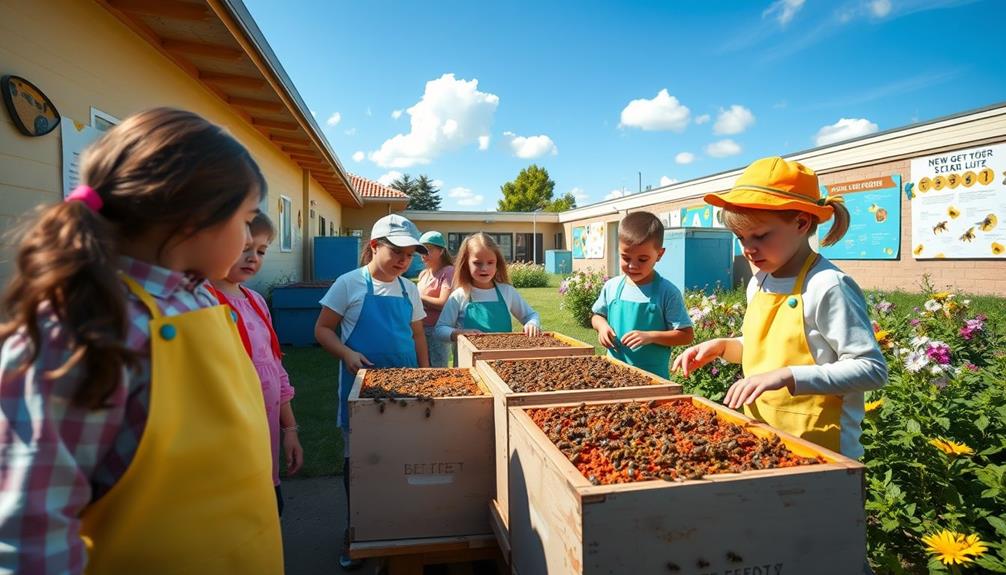
When you participate in Bee Experience Days, you'll get up close with honey and wild bees, making learning both fun and impactful.
These educational programs can be enhanced by incorporating elements similar to family-friendly amenities found in popular water parks. Activities like interactive hive naming competitions spark creativity and deepen your connection to these essential pollinators.
These hands-on experiences not only educate but also inspire a commitment to ecological conservation.
Engaging Bee Experience Days
Engaging with honey and wild bees during Bee Experience Days offers children a unique opportunity to learn about these essential pollinators up close. Since 2022, over 2,400 children have participated in 210 events at Mellifera's teaching apiary in Rosenfeld, Tübingen.
These hands-on experiences not only enhance kids' connection to nature but also promote environmental awareness through direct engagement with bees.
During these interactive days, children can expect to:
- Observe bees in their natural habitat and understand their behaviors.
- Participate in safe, guided interactions with beekeepers to learn about hive management.
- Discover the crucial role bees play in food production and biodiversity.
- Engage in fun, educational activities that reduce fear of bees.
- Foster teamwork and collaboration while exploring the importance of conservation.
As educators and beekeepers across Germany host similar events, they create a robust network of experiential learning opportunities for students.
Interactive Hive Naming Competitions
Interactive hive naming competitions spark creativity and enthusiasm among students as they immerse themselves in the world of beekeeping. These events allow you to brainstorm and present unique names for hives, drawing from themes related to bee behavior or local flora. Working in teams, you'll collaborate with classmates to decide on names and share your choices with peers or judges, fostering teamwork and communication skills.
Incorporating educational elements enhances the experience, as you can explore the significance of your chosen names in relation to bee ecology or mythology. This not only deepens your understanding of bees but also creates an interactive learning environment that encourages curiosity.
Schools often report that these competitions boost enthusiasm for beekeeping, leading to increased interest in hive management and bee biology. They can culminate in exciting school-wide events, promoting community engagement and raising awareness about the crucial role bees play in our ecosystem.
| Team Name | Hive Name | Theme |
|---|---|---|
| Team A | Nectar Haven | Local Flora |
| Team B | Buzzing Bliss | Bee Behavior |
| Team C | Honeycomb Heroes | Mythology |
| Team D | Pollinator Palace | Environmental Impact |
| Team E | Swarm Squad | Teamwork |
Interdisciplinary Teaching Opportunities
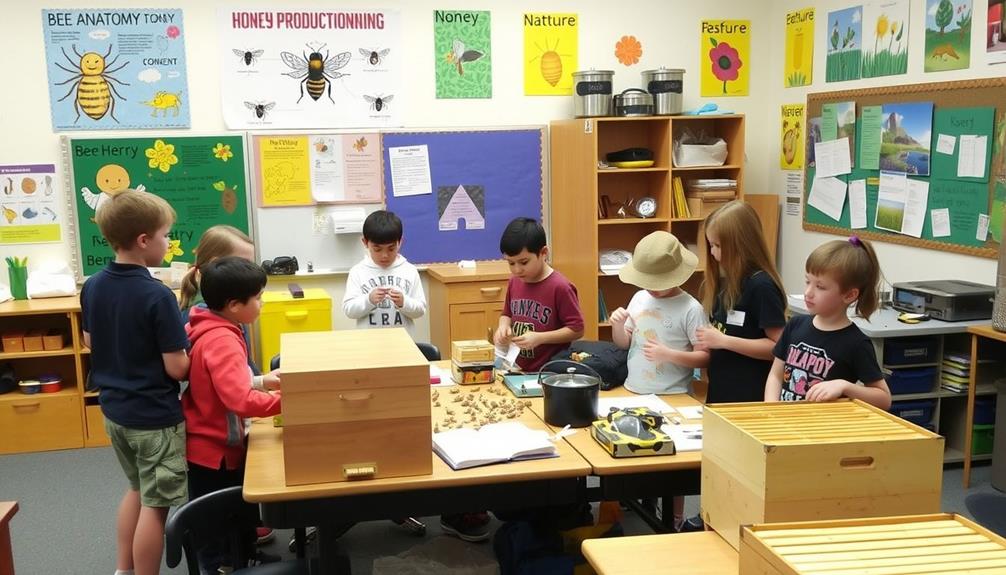
Integrating bees into the classroom opens up a wealth of interdisciplinary teaching opportunities that can enrich students' learning experiences. By using bees as a focal point, you can seamlessly blend various subjects, making lessons more engaging and relevant.
- Biology: Explore ecological relationships and biodiversity through the fascinating life cycle of bees.
- Art: Encourage creative expression with bee-themed crafts and decorations, allowing students to explore artistic projects.
- Mathematics: Apply mathematical concepts by calculating hive maintenance and understanding patterns in bee behavior.
- Language Arts: Inspire students to write stories, poems, or presentations about bees, enhancing their communication skills while highlighting the importance of these pollinators.
- Social Studies: Discuss the historical significance of bees in agriculture and their role in sustainable practices across different cultures.
Through collaborative projects, students develop teamwork and communication skills as they manage beekeeping tasks and research various bee species.
This multifaceted approach not only promotes a deeper understanding of the subject matter but also fosters a sense of responsibility and connection to the environment.
Embrace these interdisciplinary opportunities to create a dynamic and enriching learning atmosphere for your students.
Support for School Apiaries

Support for school apiaries is crucial in fostering a deeper understanding of beekeeping among students. Various federal states in Germany recognize this need and provide financial support for school beekeeping initiatives.
For instance, Saxony enhances full-day programs by funding school apiaries, while Saxony-Anhalt specifically finances the necessary beekeeping equipment for selected elementary schools.
In Bavaria, the Ministry of Agriculture offers subsidies aimed at establishing and maintaining these school apiaries, promoting a hands-on approach to learning about bees.
Similarly, Württemberg's beekeeping association actively supports local educational efforts by providing grants for creating new school apiaries.
Currently, 60 school beekeeping programs and one cooperative are registered with the Imkerverband Rheinland e.V., showcasing a robust supportive network for educational beekeeping initiatives.
This network not only helps schools gain access to crucial resources but also connects students and educators with experienced beekeepers.
Educational Resources and Materials

When you're teaching students about bees and their essential role in our ecosystem, having the right educational resources can make all the difference. You can enhance their learning experience through a variety of materials that engage and inform.
Consider incorporating literature and multimedia into your lessons to create a rich educational environment.
Here are some valuable resources you can use:
- "Bees Make School": A practical guide for implementing bee-related educational programs.
- Bavarian Institute materials: Interdisciplinary teaching resources focused on bee education.
- Read-aloud stories: Engaging books like "Kleine Biene Sonnenstrahl" and "Summs und die Honigbienen" that introduce bee themes and promote literacy.
- Educational literature: Books such as "Bienen halten in der Schule" and "Mit Kindern im Bienengarten" offer insights and planning resources for establishing beekeeping programs.
- Multimedia materials: Films and podcasts that explore the ecological significance of bees, making learning interactive and dynamic.
Community Engagement and Collaboration

Engaging with local partners can markedly enhance your school's beekeeping program.
By collaborating with local beekeepers and organizations, you can create valuable learning opportunities for students while fostering a sense of community.
Together, you can promote awareness of bee conservation and support environmental stewardship initiatives.
Local Partnerships and Support
By forming local partnerships with beekeeping associations like Stadtbienen, schools can access invaluable resources and education packages that make launching beekeeping programs more effective.
These collaborations not only enrich the curriculum but also enhance student learning experiences. Local beekeepers can provide mentorship, guiding students through practical insights into beekeeping practices that textbooks can't offer.
Engaging with the community helps in organizing bee-themed events, raising awareness about the critical role of pollinators and biodiversity. This collective effort fosters a sense of responsibility towards environmental stewardship among students.
To support these initiatives, schools can explore various funding opportunities, ensuring their beekeeping projects remain sustainable.
Here's how local partnerships can enhance your program:
- Access to educational resources and materials.
- Mentorship opportunities from experienced beekeepers.
- Organizing community events to raise awareness.
- Funding assistance from regional grants.
- Collaboration with environmental organizations for conservation efforts.
Collaborative Learning Opportunities
Collaborative learning opportunities in beekeeping education create a dynamic environment where students can thrive. By partnering with local beekeepers, you enhance both your expertise and support network, making it easier to navigate the complexities of bee education.
Engaging with community initiatives, like organizing bee-themed events and fairs, gives students hands-on experiences while raising awareness about local biodiversity.
When your school collaborates with regional beekeeping associations, you reveal valuable resources, mentorship, and even funding opportunities. This connection not only enriches your educational programs but also strengthens ties within the community.
Networking platforms further facilitate the sharing of methodologies, insights, and best practices among educators, fostering a culture of mutual support and knowledge exchange.
You might also consider collaborative projects like establishing school gardens that attract bees. These gardens not only serve as educational environments but also promote ecological understanding and community involvement.
Frequently Asked Questions
What Is the Beehive Called by Beekeepers?
Beekeepers commonly call a beehive an "apiary," which refers to the location where bee colonies are kept. Each hive can contain thousands of bees, with various types designed for specific beekeeping practices.
What Does a Beekeeper Do Explained for Children?
A beekeeper takes care of bees by providing food, ensuring a safe home, and checking their health. You'll learn about bee behavior, collect honey, and help protect these important insects in our ecosystem.
When Can I Call Myself a Beekeeping Operation?
When you've got a few hives, registered with local authorities, and completed a basic beekeeping course, you can proudly call yourself a beekeeping operation. Just remember to follow safety protocols!
How Much Does a Bee Colony Cost?
A bee colony typically costs between €100 to €300, depending on the supplier and region. Remember to factor in additional equipment expenses, which can range from €200 to €500, plus annual maintenance costs.
Conclusion
Incorporating beekeeping into schools can transform education, engaging students in hands-on learning while fostering a love for nature. Imagine a middle school where students name their hives after local flowers, learning about pollination and ecology. They could even host a bee-themed competition, inviting the community to participate. This not only enhances their understanding but also strengthens community ties, making learning about bees a sweet experience for everyone involved. So, why not buzz into beekeeping education today?
